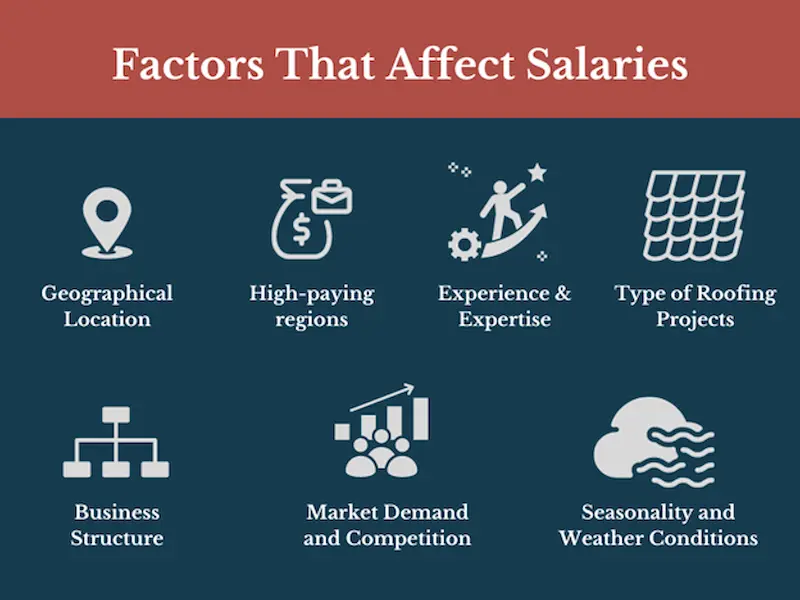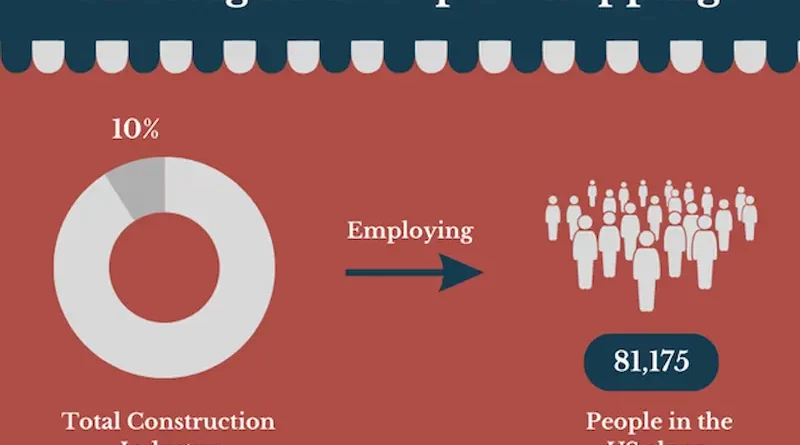How Much Does a Roofing Contractor Make?
Roofing contractors play a crucial role in ensuring the structural integrity and protection of our homes. They are skilled professionals who specialize in installing, repairing, and maintaining roofs. While their work is indispensable, have you ever wondered how much a roofing contractor makes? In this blog post, we will look into the factors that influence the earnings potential of roofing contractors and provide insights into the range of incomes they can expect.
Table of Contents
A Growing Industry
Home construction is a large and growing industry that is set to take off more as millennials gain buying power and seek out home ownership. And according to Ridgeline, roofing makes up a whopping 10% of the total construction industry, employing about 81,175 people in the US alone.
The Factors That Affect Salaries

Roofing contractors make anywhere from $35,000 to well over $100,000 a year, depending on factors including experience, geographic location, and the size of the company. Experienced roofers with many years in the industry can expect to earn more, whereas those just starting out will be making less. Location also plays a role in what you can expect to make as a roofer.
Geographical Location
Geographical location plays a crucial role in determining a roofing contractor’s income. Salaries can vary significantly depending on the region and local market conditions. Roofing contractors working in urban areas or regions with high construction activity tend to earn more than those in rural or less developed areas. Additionally, contractors in areas with severe weather conditions, such as hail storms or hurricanes, may experience increased demand for their services, leading to higher incomes.
High-paying regions for roofing contractors
High-paying regions for roofing contractors are typically found in areas with a strong demand for construction services, a growing real estate market, and frequent weather-related challenges. Urban centers with booming development, such as metropolitan areas and fast-growing suburbs, often offer lucrative opportunities for roofing contractors due to the continuous need for new roofs and repairs. Moreover, regions prone to severe weather events, like hurricanes or hail storms, see an increased demand for roofing services, leading to higher pay for contractors during those periods. Additionally, areas with a high concentration of high-income homeowners who prioritize quality roofing work also tend to offer better compensation for experienced and skilled roofing professionals. As roofing is an essential aspect of maintaining property value and ensuring structural integrity, contractors in these high-paying regions can capitalize on their expertise and experience to command competitive rates for their services.
Experience and Expertise
One of the primary factors influencing a roofing contractor’s income is their level of experience and expertise. Newer contractors who are just starting may earn a modest income as they build their reputation and clientele. However, as they gain more experience and expertise in the field, their earning potential tends to increase significantly. Experienced contractors often command higher rates and have the advantage of a robust referral network.
Types of Roofing Projects
The type of roofing projects undertaken by a contractor can also impact their earnings. Roofing contractors may specialize in various types of roofs, such as shingles, metal, tile, or flat roofs. Some materials and styles require specialized skills and knowledge, which can contribute to higher rates. Additionally, complex projects, such as commercial roofing installations or historical restoration work, often command premium prices due to the expertise and attention to detail required.
Business Structure
The way roofing contractors structure their businesses can influence their earnings. Some contractors operate as independent sole proprietors, while others may have partnerships or own roofing companies with multiple employees. Owning a roofing company allows contractors to earn not only from their labor but also from the work performed by their employees. However, it also involves additional responsibilities and overhead costs that can impact net earnings.
Market Demand and Competition
The demand for roofing services and the level of competition within a specific market can affect a contractor’s income. In areas with a high concentration of roofing contractors, competition may drive down prices, making it challenging to command higher rates. On the other hand, in markets with limited competition, contractors may have more flexibility in setting their prices, potentially earning higher incomes.
Seasonality and Weather Conditions
Seasonality and weather conditions can impact the workload and earnings of roofing contractors. In some regions, roofing work may slow down during colder months or periods of heavy rainfall or snowfall. Conversely, the arrival of warmer seasons and stormy weather can create a surge in demand for roofing services. Contractors may need to account for these fluctuations and plan their finances accordingly.
While the earnings of a roofing contractor can vary based on numerous factors, the profession offers the potential for a respectable income. Through experience, expertise, and reputation, roofing contractors can command higher rates and increase their earning potential over time. Geographical location, project types, business structure, market demand, and weather conditions all influence the income of roofing contractors. By understanding these factors and adapting to the ever-changing dynamics of the industry, roofing contractors can carve out successful and rewarding careers in the field.
Getting Started in Roofing
Are you interested in starting a career in roofing? If so, then there are a few things you need to consider. You will need to obtain the necessary licenses and certifications in your local area before you can begin working as a roofing contractor. You should also familiarize yourself with all applicable regulations, industry standards, and safety protocols to ensure compliance with the law. Additionally, you should develop a business plan that outlines your target markets, preferred services, pricing structure, and promotional strategies. Finally, research the competition to understand the current landscape of your local market.
Once you have taken care of the logistics, it is time to start marketing yourself as a roofing contractor. You can leverage online channels such as social media, search engine optimization (SEO), and paid advertising to reach potential customers. Additionally, you can bootstrap your business affordably by simply door knocking in areas where it’s permitted by law. You can also take advantage of word-of-mouth referrals from your existing customers and incentivize them with discounts or loyalty rewards. Lastly, consider joining a local business organization in order to get connected with other businesses.
These strategies will help you build a successful roofing contracting business and increase your visibility as a professional in the industry. By following the suggestions outlined above, you’ll be well on your way to becoming a successful roofing contractor in no time! Good luck!

